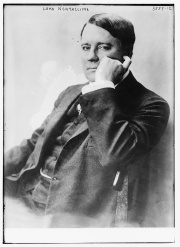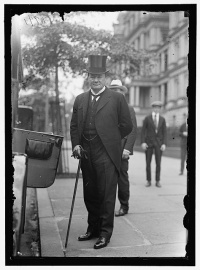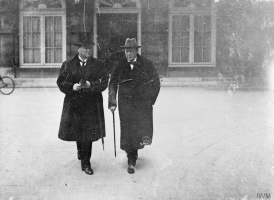Introduction↑
Alfred Harmsworth (1865-1922), ennobled in 1905 as Lord Northcliffe, was the most influential and controversial British newspaper proprietor of the modern era. He founded the Daily Mail (1896) and the Daily Mirror (1903), the two most successful daily newspapers of the early 20th century. He had strong political views and repeatedly used his newspapers to intervene in public life. During the First World War he was at the height of his powers, and created numerous political storms with his scathing criticisms of the military and civilian administration, and his plotting against Prime Minister Herbert Henry Asquith (1852-1928).
Northcliffe was born near Dublin in 1865, and moved into journalism at an early age, with the spectacular success of the Daily Mail and the Daily Mirror ensuring his fame and fortune. His ambitions grew with the purchase, in 1908, of the most prestigious London daily, The Times, although the Daily Mail remained his main platform for political campaigning.
Predicting the War↑
From the turn of the century, Northcliffe was preoccupied by the threats that Britain faced from Wilhelm II, German Emperor’s (1888-1918) Germany. In spring 1906, the Mail lavishly serialised popular author William Le Queux’s (1864-1927) Invasion of 1910, a dramatic narrative of a German incursion into Britain. Three years later, the paper printed an inflammatory series written by the socialist journalist Robert Blatchford (1851-1943) arguing that Germany sought to undermine the British Empire. The warnings continued to flow until 1914, and when war finally broke out the Mail styled itself as “the paper that foretold the war” and proudly published a selection of its “scaremongerings” as a sixpenny pamphlet. For the paper’s critics, the Mail’s irresponsible stoking of anti-German sentiment actually helped to create the conditions which enabled the descent into conflict. “Next to the Kaiser,” wrote the esteemed editor and journalist A.G. Gardiner (1865-1946), “Lord Northcliffe has done more than any other living man to bring about the war.”[1] Northcliffe would not, however, be deflected from what he viewed as his duty to his country.
Wartime Interventions↑
On the Attack↑
Northcliffe had no doubts about the rightness of the British cause and the Mail’s front-page slogan was duly altered to “For King and Country”. He was soon frustrated, however, with the strict censorship imposed on the British press at the battlefront, and he became increasingly convinced that several men in leading positions were not up to their job – including the Prime Minister, Asquith, the First Lord of the Admiralty, Winston Churchill (1874-1965), and the Secretary of State for War, Lord Horatio Herbert Kitchener (1850-1916).
The episode that crystallised this concern, and which saw Northcliffe putting his reputation on the line, was the “shells scandal” of May 1915. Northcliffe had received letters from the front claiming that British military operations were being undermined by the lack of the right kind of shell, and after the Allies failed to capitalise on an initial breakthrough at Neuve Chapelle due to a lack of munitions, these criticisms began to be publicly aired. On 21 May 1915, the Mail published an incendiary piece personally written by Northcliffe and headlined “The Tragedy of the Shells: Lord Kitchener’s Grave Error.” Northcliffe argued that Kitchener had “starved the army in France of high-explosive shells”, and was thereby responsible for the deaths of thousands of soldiers.[2] Such a direct public attack on a military leader at a time of national crisis was shocking, and generated fury among many of Northcliffe’s critics. Members of the London Stock Exchange burned copies of The Times and the Mail, advertisers cancelled contracts, and thousands of readers turned away. Northcliffe, though, was undaunted, and his opponents were soon forced to concede that there were indeed problems with Britain’s munitions supply. Although Kitchener survived in the short term, at the end of May 1915 Asquith was forced to form a coalition administration, with David Lloyd George (1863-1945) appointed Minister of Munitions, to address the supply problems.
Northcliffe remained on the offensive. The Mail attacked the mistakes of the Gallipoli campaign, demanded a streamlined and decisive “war cabinet”, and called for the introduction of conscription to end the “recruiting muddle”. Over the course of 1916, the tide seemed to turn in Northcliffe’s direction. Conscription was introduced, while Northcliffe greeted Kitchener’s death at sea in July 1916 with barely concealed relief. By the end of the year, Asquith was losing his authority, and behind the scenes, Northcliffe and Max Aitken, Lord Beaverbrook (1879-1964), the new owner of the Daily Express, assisted the manoeuvres of those conspiring to elevate the more dynamic Lloyd George to the premiership. These dramatic events did much to enhance the myth of the “press barons” wielding immense political power: many now saw Northcliffe as a dominant force in the administration. The reality was rather different: Lloyd George was shrewd enough not to concede too much to the men from Fleet Street, and Northcliffe remained keen to keep some political independence.
Official positions↑
Nevertheless, Northcliffe was soon rewarded for his political support by being appointed, in May 1917, as head of the war mission to the United States – a move which had the additional benefit, from Lloyd George’s perspective, of diverting Northcliffe’s attention from domestic politics. It was a difficult posting, complicated by the suspicions of the British ambassador, Sir Cecil Spring Rice (1859-1918). In February 1918 he became a Director of Propaganda in Enemy Countries, a role which made better use of his journalistic skills. Northcliffe’s contribution to the efforts to undermine the morale of the German army on the Western Front, with soldiers in the final months of the conflict being deluged with material emphasising the futility of their efforts, earned him a reputation in Germany as a demonic, mendacious figure. In Britain, too, he was regarded with considerable suspicion, with senior Conservative MP Austen Chamberlain (1863-1937) attacking Lloyd George’s government for becoming “intimately associated” with “great newspaper proprietors”.[3]
Peace-making and Legacy↑
Northcliffe was in favour of imposing punitive terms on Germany at the end of the war, but his influence soon began to wane. His political standing was severely weakened by Lloyd George’s excoriating attack in the House of Commons on 16 April 1919, denouncing his attempts to meddle in post-war peace-making. Northcliffe’s health was faltering, and he died, aged fifty-seven, at his home in London on 14 August 1922 after complications from a blood infection. His status was recognised by burial in Westminster Abbey. His legacies in the field of journalism were many and varied – among them, the powerful reinforcement of the press tradition of scrutinising and critiquing those responsible for the prosecution of war.
Adrian Bingham, University of Sheffield
Section Editor: Jennifer Wellington
Notes
Selected Bibliography
- Boyce, D. George: Harmsworth, Alfred Charles William, viscount Northcliffe (1865–1922), in: Matthew, H. C. G. / Harrison, Brian Howard (eds.): Oxford dictionary of national biography, volume 25, Oxford; New York 2004: Oxford University Press.
- Pound, Reginald / Harmsworth, Geoffrey: Northcliffe, London 1959: Cassell.
- Taylor, S. J.: The great outsiders. Northcliffe, Rothermere, and the Daily Mail, London 1996: Weidenfeld & Nicolson.
- Thompson, J. Lee: Northcliffe. Press baron in politics, 1865-1922, London 2000: John Murray.
- Thompson, J. Lee: Politicians, the press and propaganda. Lord Northcliffe and the Great War, 1914-1919, Kent, Ohio 1999: Kent State University Press.










